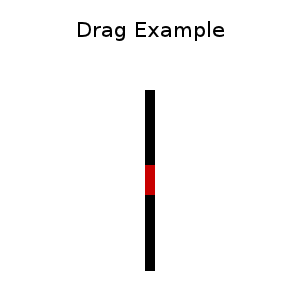|
Tizen Native API
6.5
|
This example shows how to manipulate a dragable part through the edje_object_part_drag API.
First, in the edc code, we are declaring a part which will be our movable part, called "knob". It is a normal rectangle, which contains a block called "dragable", that will define the area where this rectangle can be moved, and in which axis it can be moved.
This is our part:
Notice that it defines, through its "x:" and "y:' properties, that the part will be only moved on the y axis (vertical). Check the edc reference docs for more info about this.
Now, in our example C code, we just do the same as on the other examples, setting some global data on a structure, load the edje file and so:
static const char *PARTNAME = "example/knob";
We want to use the drag_page and drag_step functions, and in order to do so we need to define the step size and page size of our dragable part. They are defined as float values which represent a portion of the entire size of the dragable area:
We are going to use the keyboard to move the knob part, through the key down callback _bg_key_down, but we also want to know when the user has moved the knob by using the mouse (which is possible, since we defined that this part will receive mouse events). Thus, we set a callback for the signal "drag", which comes from the dragable part:
evas_object_event_callback_add(bg, EVAS_CALLBACK_KEY_DOWN, _on_bg_key_down, ee);
edje_object_signal_callback_add(edje_obj, "drag", PARTNAME, _on_knob_moved, NULL);
Now, let's take a look at our key down callback:
_on_bg_key_down(void *data, Evas *e EINA_UNUSED, Evas_Object *o EINA_UNUSED, void *event_info) { Ecore_Evas *ee; Evas_Event_Key_Down *ev; Evas_Object *edje_obj; ee = (Ecore_Evas *)data; ev = (Evas_Event_Key_Down *)event_info; edje_obj = ecore_evas_data_get(ee, "edje_obj"); if (!strcmp(ev->key, "h")) { printf(commands); return; } else if (!strcmp(ev->key, "Down")) { edje_object_part_drag_step(edje_obj, PARTNAME, 0, 1.0); } else if (!strcmp(ev->key, "Up")) { edje_object_part_drag_step(edje_obj, PARTNAME, 0, -1.0); } else if (!strcmp(ev->key, "m")) { edje_object_part_drag_value_set(edje_obj, PARTNAME, 0.0, 0.5); } else if (!strcmp(ev->key, "Prior")) { edje_object_part_drag_page(edje_obj, PARTNAME, 0.0, -1.0); } else if (!strcmp(ev->key, "Next")) { edje_object_part_drag_page(edje_obj, PARTNAME, 0.0, 1.0); } else if (!strcmp(ev->key, "Escape")) ecore_main_loop_quit(); else { printf("unhandled key: %s\n", ev->key); printf(commands); } }
On this callback we define that the user will use the "up" and "down" arrows to move the dragable part, respectively, -1.0 and 1.0 times the step size. And that the "Page Up" (Prior) and "Page Down" (Next) keys will move -1.0 and 1.0 times the page size. Both of these will occur on the vertical axis, since we pass 0.0 as value to the respective horizontal axis parameters. And our dragable part also only supports being moved in the vertical axis (defined in the edc).
We also define that the "m" key will be used to explicitly position the knob part in the middle of the dragable area.
And here is the callback for the "drag" signal that is received from the theme:
_on_knob_moved(void *data EINA_UNUSED, Evas_Object *o, const char *emission EINA_UNUSED, const char *source EINA_UNUSED) { double val; edje_object_part_drag_value_get(o, PARTNAME, NULL, &val); printf("value changed to: %0.3f\n", val); }
The example's window should look like this picture:

The full source code follows:
#ifdef HAVE_CONFIG_H # include "config.h" #else # define EINA_UNUSED #endif #ifndef PACKAGE_DATA_DIR #define PACKAGE_DATA_DIR "." #endif #include <Ecore.h> #include <Ecore_Evas.h> #include <Edje.h> #define WIDTH 300 #define HEIGHT 300 static const char commands[] = \ "commands are:\n" "\tDown - set drag step to 1\n" "\tUp - set drag step to -1\n" "\tm - set drag value to 0.5\n" "\tPrior - set drag page to -1\n" "\tNext - set drag page to -1\n" "\tEsc - exit\n" "\th - print help\n"; static const char *PARTNAME = "example/knob"; static void _on_destroy(Ecore_Evas *ee EINA_UNUSED) { ecore_main_loop_quit(); } /* here just to keep our example's window size and background image's * size in synchrony */ static void _on_canvas_resize(Ecore_Evas *ee) { Evas_Object *bg; Evas_Object *edje_obj; int w; int h; bg = ecore_evas_data_get(ee, "background"); edje_obj = ecore_evas_data_get(ee, "edje_obj"); ecore_evas_geometry_get(ee, NULL, NULL, &w, &h); evas_object_resize(bg, w, h); evas_object_resize(edje_obj, w, h); } static void _on_bg_key_down(void *data, Evas *e EINA_UNUSED, Evas_Object *o EINA_UNUSED, void *event_info) { Ecore_Evas *ee; Evas_Event_Key_Down *ev; Evas_Object *edje_obj; ee = (Ecore_Evas *)data; ev = (Evas_Event_Key_Down *)event_info; edje_obj = ecore_evas_data_get(ee, "edje_obj"); if (!strcmp(ev->key, "h")) { printf(commands); return; } else if (!strcmp(ev->key, "Down")) { edje_object_part_drag_step(edje_obj, PARTNAME, 0, 1.0); } else if (!strcmp(ev->key, "Up")) { edje_object_part_drag_step(edje_obj, PARTNAME, 0, -1.0); } else if (!strcmp(ev->key, "m")) { edje_object_part_drag_value_set(edje_obj, PARTNAME, 0.0, 0.5); } else if (!strcmp(ev->key, "Prior")) { edje_object_part_drag_page(edje_obj, PARTNAME, 0.0, -1.0); } else if (!strcmp(ev->key, "Next")) { edje_object_part_drag_page(edje_obj, PARTNAME, 0.0, 1.0); } else if (!strcmp(ev->key, "Escape")) ecore_main_loop_quit(); else { printf("unhandled key: %s\n", ev->key); printf(commands); } } static void _on_knob_moved(void *data EINA_UNUSED, Evas_Object *o, const char *emission EINA_UNUSED, const char *source EINA_UNUSED) { double val; edje_object_part_drag_value_get(o, PARTNAME, NULL, &val); printf("value changed to: %0.3f\n", val); } int main(int argc EINA_UNUSED, char *argv[] EINA_UNUSED) { const char *edje_file = PACKAGE_DATA_DIR"/drag.edj"; Ecore_Evas *ee; Evas *evas; Evas_Object *bg; Evas_Object *edje_obj; if (!ecore_evas_init()) return EXIT_FAILURE; if (!edje_init()) goto shutdown_ecore_evas; /* this will give you a window with an Evas canvas under the first * engine available */ ee = ecore_evas_new(NULL, 0, 0, WIDTH, HEIGHT, NULL); if (!ee) goto shutdown_edje; ecore_evas_callback_destroy_set(ee, _on_destroy); ecore_evas_callback_resize_set(ee, _on_canvas_resize); ecore_evas_title_set(ee, "Edje Drag Example"); evas = ecore_evas_get(ee); bg = evas_object_rectangle_add(evas); evas_object_color_set(bg, 255, 255, 255, 255); evas_object_resize(bg, WIDTH, HEIGHT); evas_object_focus_set(bg, EINA_TRUE); evas_object_show(bg); ecore_evas_data_set(ee, "background", bg); evas_object_event_callback_add(bg, EVAS_CALLBACK_KEY_DOWN, _on_bg_key_down, ee); edje_obj = edje_object_add(evas); if (!edje_object_file_set(edje_obj, edje_file, "example/group")) printf("failed to set file %s.\n", edje_file); evas_object_move(edje_obj, 0, 0); evas_object_resize(edje_obj, WIDTH, HEIGHT); evas_object_show(edje_obj); ecore_evas_data_set(ee, "edje_obj", edje_obj); edje_object_part_drag_size_set(edje_obj, PARTNAME, 1.0, 0.4); if (!edje_object_part_drag_step_set(edje_obj, PARTNAME, 0.0, 0.1)) printf("error when setting drag step size.\n"); if (!edje_object_part_drag_page_set(edje_obj, PARTNAME, 0.0, 0.3)) printf("error when setting drag page step size.\n"); edje_object_signal_callback_add(edje_obj, "drag", PARTNAME, _on_knob_moved, NULL); printf(commands); ecore_evas_show(ee); ecore_main_loop_begin(); ecore_evas_free(ee); ecore_evas_shutdown(); edje_shutdown(); return EXIT_SUCCESS; shutdown_edje: edje_shutdown(); shutdown_ecore_evas: ecore_evas_shutdown(); return EXIT_FAILURE; }
To compile use this command:
* gcc -o edje-drag edje-drag.c -DPACKAGE_BIN_DIR=\"/Where/enlightenment/is/installed/bin\" -DPACKAGE_LIB_DIR=\"/Where/enlightenment/is/installed/lib\" * -DPACKAGE_DATA_DIR=\"/Where/enlightenment/is/installed/share\" * `pkg-config --cflags --libs evas ecore ecore-evas edje` * * edje_cc drag.edc *